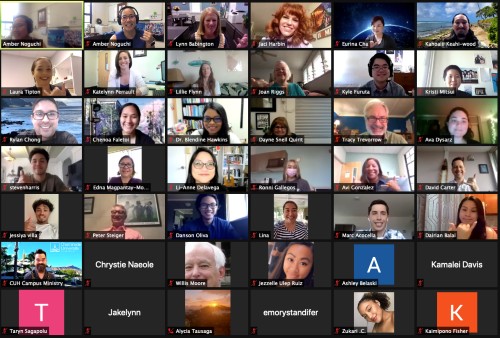In 2009, an 8.1 magnitude earthquake in the Pacific Ocean generated a massive tsunami that roared onshore in American Samoa and Samoa with wave heights of up to 55 feet. Nearly 200 people were lost and dozens of homes and buildings were destroyed. The price tag of the damage exceeded $200 million.
Timothy Dunstan, who grew up in American Samoa, remembers the unfathomable scale of devastation.
He also remembers the American Red Cross swooping in to help, bringing needed supplies, disaster management expertise and counseling support for families who had lost so much. He says the incredible work of the nonprofit, helping people when they needed it the most, inspired him to join the Red Cross as a volunteer himself when he moved to Hawaii in 2017 to attend Chaminade University.

And he’s stuck with it ever since, putting in hundreds of hours of volunteer work even as he also completes the extensive studies needed to earn a double major in Psychology and Criminology and Criminal Justice.
Dunstan, who is set to graduate in December, has responded to dozens of crises and disasters for the American Red Cross. He’s helped families displaced by house fires and assisted in overseeing emergency shelter operations during several close calls from hurricanes and in the wake of major flooding.
In 2020, after the fatal shooting of two Honolulu police officers and an intentionally set blaze that destroyed several homes in Diamond Head, Dunstan worked with impacted residents and served as a liaison between families and the police. Also last year, he helped a family from Alaska who had been stranded in American Samoa for three months because of the territory’s COVID-19 lockdown.
The 22-year-old’s selfless work for the Red Cross has made him a hero to countless people.
And this year, he’s also been recognized as an American Red Cross of Hawaii “Volunteer Hero.” In naming him for the award, the nonprofit said Dunstan “embodies the heart of the Red Cross mission, stepping up to take the lead in a variety of casework” and ease the suffering of those in crisis.

Dunstan, who was born in New Zealand, said his family has always contributed to the community in “different roles of servitude.” And so when he moved to the islands to attend Chaminade, he decided to “give it a go” as a Red Cross volunteer “and see if it fits.” He found a nonprofit that allowed him to serve the community in a powerful way. And at Chaminade, he found a university that supported that work.
“A lot of our work is based on comforting clients. If people need help, we’re there,” Dunstan said.
He added Chaminade’s mission of public service has not only helped drive him in his Red Cross volunteering, but has also inspired him to apply what he’s learning in the classroom—especially in psychology—to his service for the community. “Having someone who has lost everything be able to just say, ‘Thank you,’ it’s when you know you’ve made a difference,” Dunstan said.
“It’s really something that opens your eyes to the world.”
After graduation, Dunstan hopes to pursue a career serving others. He’s weighing potential options now, but says he may consider law school—to become a prosecutor—or seek a career in forensic psychology. In the meantime, he said, he also wants to get others involved with Red Cross work. So he’s working with other students to start a Red Cross club at Chaminade and is recruiting new participants now.

















